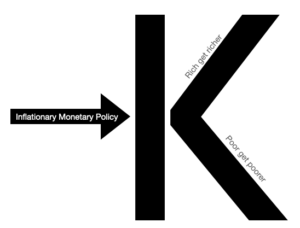
In a recent meeting with a couple of real estate investors, I was posed with the question:
Doesn’t the weak dollar eat into the profit of foreign real estate investing?
Not at all; in fact, quite the contrary. A weak dollar makes spending dollars in foreign countries disadvantageous. I ran into this a few years ago in Sweden. I went to buy a t-shirt and it cost the equivalent of $85 USD. I asked my Swedish friend if this shirt was expensive, and he replied “no”. That’s when I learned firsthand that the plummeting dollar is making international vacationing more expensive for Americans.
Spending money on foreign real estate
The same does apply to real estate purchase for personal use. If you find a beautiful property in a foreign country that you’d like to buy for personal use, it’s going to cost a lot more today than it did 5 years ago. You’re spending US dollars and you’re going to have to spend a lot more now since they are worth less thanks to inflation.
Investing money in foreign real estate
Investment into real estate is done to accomplish one or both of the following objectives:
- Produce [Rental] Income – I believe this should be the primary objective of any investment. Income is more predicable and controllable than appreciation.
- Appreciation / Capital Gains – This is the focus of most novice investors.
When investing in foreign real estate, you convert the appropriate amount of US Dollars into local currency, and you will purchase the property in local currency. Regardless of whether you receive your return on investment from #1 above, #2 above or both… you will receive it in local currency. If you buy property in Sweden, you will receive rental income in kronor (Swedish crowns) and proceeds from the sale of the property will also be in Swedish crowns.
Scenario 1. If the dollar is weak (relative to its historic value), but its value remains constant during your ownership of the Swedish property, your return-on-investment (ROI) will be unaffected by the dollar’s weakness.
Scenario 2. If the dollar is weak, and it continues to weaken during your ownership of the Swedish property, your ROI in Swedish crowns will remain unaffected, but in USD your ROI will be increased.
Scenario 3. If the dollar is weak, but it rebounds and strengthens in value during your ownership of the Swedish property, in USD your ROI will suffer. The dollar can only bounce back if the Fed completely reverses its monetary policy. In this case, interest rates will go up to 13% – 20%, and the entire US economy will essentially crash. Here there will be so many opportunities that as long as you didn’t put your entire investment portfolio into the Swedish property, riding the bear market down in short positions will more than compensate for the lessened ROI on the Swedish property.
Weakening dollar makes domestic real estate investment a bad idea
The weakened dollar has hurt real estate in the last 2 years. During this time, inflation has been at 10% – 12%, while housing values have been stagnant or even declined in some localities. This means all our homes have decreased in actual value 10%+.
If you believe interest rates will remain low and that Fed will continue its inflationary policies, investing in U.S. real estate might not carry a very good ROI. If your property is returning you 12% annually, but inflation is at 12%… you have successfully stored and protected your wealth, but you have not grown it. The continued weakening dollar will hurt domestic real estate unless real estate appreciation outpaces inflation. Using the increasing money supply as a forecaster, inflation is heading towards 16%. I don’t think real estate values (or rents) will increase by 16% per year over the next few years, so this tells me that while our inflation continues, domestic real estate investment performance [in general] will suffer.
Summary
- The weakened dollar has made spending money in foreign countries expensive for Americans.
- The weakened dollar has not affected real estate investment into foreign countries.
- Should the dollar’s weakening/debasement continue, ROI in foreign investments will increase.
- Should Fed’s monetary policy reverse, we will experience deflation and an economic collapse. In this circumstance, there will be tremendous investment opportunities for anyone who has enough liquidity to take advantage of the moving markets.
Concepts to consider
- Reduce your exposure to the US Dollar now to protect your wealth
- Keep enough liquidity to enable you to react to the possibility of coming reversal in Fed’s monetary inflationary policies
- Hold that liquidity in assets denominated in a foreign currency – preferably a currency from a country whose monetary system is generally sound and stable such as Canada or Switzerland


